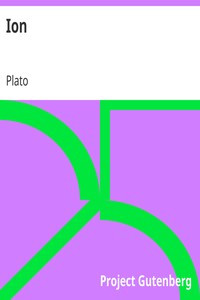Ion by Plato
"Ion" by Plato is a dialogue written in ancient Greece. In this short work, Socrates questions Ion, a professional rhapsode who performs and lectures on Homer's poetry. Their conversation explores a provocative question: does Ion's skill come from genuine knowledge and artistic technique, or from divine possession? Through pointed questioning, Socrates challenges Ion's claims of expertise, suggesting that poets and their performers may be inspired vessels of the gods rather than masters
of craft—a conclusion the rhapsode resists accepting. (This is an automatically generated summary.)
Read or download for free
| How to read | Url | Size | |||
|---|---|---|---|---|---|
| Read now! | https://www.gutenberg.org/ebooks/1635.html.images | 67 kB | |||
| EPUB3 (E-readers incl. Send-to-Kindle) | https://www.gutenberg.org/ebooks/1635.epub3.images | 73 kB | |||
| EPUB (older E-readers) | https://www.gutenberg.org/ebooks/1635.epub.images | 72 kB | |||
| Kindle | https://www.gutenberg.org/ebooks/1635.kf8.images | 137 kB | |||
| older Kindles | https://www.gutenberg.org/ebooks/1635.kindle.images | 130 kB | |||
| Plain Text UTF-8 | https://www.gutenberg.org/ebooks/1635.txt.utf-8 | 55 kB | |||
| Download HTML (zip) | https://www.gutenberg.org/cache/epub/1635/pg1635-h.zip | 70 kB | |||
| There may be more files related to this item. | |||||
Similar Books
About this eBook
| Author | Plato, 428? BCE-348? BCE |
|---|---|
| Translator | Jowett, Benjamin, 1817-1893 |
| Title | Ion |
| Note | Wikipedia page about this book: en.wikipedia.org/wiki/Ion_(dialogue) |
| Credits | Produced by Sue Asscher, and David Widger |
| Reading Level | Reading ease score: 73.2 (7th grade). Fairly easy to read. |
| Language | English |
| LoC Class | PA: Language and Literatures: Classical Languages and Literature |
| Subject | Classical literature |
| Subject | Homer. Iliad |
| Subject | Poetics -- History -- To 1500 |
| Subject | Aesthetics, Ancient |
| Category | Text |
| EBook-No. | 1635 |
| Release Date | Feb 1, 1999 |
| Most Recently Updated | Jan 16, 2013 |
| Copyright Status | Public domain in the USA. |
| Downloads | 2066 downloads in the last 30 days. |
| Project Gutenberg eBooks are always free! | |

